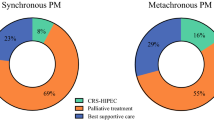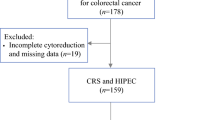Abstract
Purpose
Peritoneal metastasis in gastric cancer (GC) is a late-stage condition with a poor prognosis. Cytoreductive surgery combined with hyperthermic intraperitoneal chemotherapy (HIPEC) is a popular treatment for peritoneal metastases. Here, we aim to investigate the real-world application and efficacy of HIPEC alone for GC patients with synchronous peritoneal metastases.
Methods
We conducted a retrospective analysis on GC patients with synchronous peritoneal metastasis at the Sixth Affiliated Hospital of Sun Yat-sen University between January 2011 and December 2022. Survival analyses and Cox regression models were performed based on overall survival (OS) and cancer-specific survival (CSS), and subgroup analysis was used to determine the prognostic value of HIPEC across different treatment.
Results
We enrolled 250 patients, of whom 120 (48%) received HIPEC while 130 (52%) did not. HIPEC showed no survival benefit for GC patients (P = 0.220 for OS and P = 0.370 for CSS). However, subgroup analysis found that HIPEC can only improve OS and CSS when combined with primary tumor resection (P = 0.034 for OS and P = 0.036 for CSS). Moreover, survival analyses also demonstrated that HIPEC independently improved OS (HR for OS = 0.58, 95% CI 0.37–0.92, P = 0.020) and CSS (HR for CSS = 0.58, 95% CI 0.37–0.93, P = 0.024) for patients who underwent primary site resection, but not for those who did not.
Conclusion
HIPEC can improve survival in GC patients with synchronous peritoneal metastases who have primary tumor resection, but not in those without primary tumor resection.




Similar content being viewed by others
Availability of data and materials
The datasets used and analyzed during the current study are available from the corresponding author on reasonable request.
Abbreviations
- BMI:
-
Body mass index
- CA:
-
Carbohydrate antigen
- CEA:
-
Carcinoembryonic antigen
- CI:
-
Confidence interval
- CRS:
-
Cytoreductive surgery
- CSS:
-
Cancer-specific survival
- CT:
-
Computed tomography
- GC:
-
Gastric cancer
- HIPEC:
-
Hyperthermic intraperitoneal chemotherapy
- HR:
-
Hazard ratio
- MRI:
-
Magnetic resonance imaging
- OS:
-
Overall survival
- PD-1:
-
Programmed cell death protein 1
- PET-CT:
-
Positron emission tomography-computed tomography
- PCI:
-
Peritoneal cancer index
- PIPAC:
-
Pressurized intraperitoneal aerosol chemotherapy
- P stage:
-
Staging of peritoneal metastasis
- TNM:
-
Tumor-node-metastasis
References
Ajani JA, D’Amico TA, Bentrem DJ, Chao J, Cooke D, Corvera C et al (2022) Gastric cancer, version 2.2022, NCCN clinical practice guidelines in oncology. J Natl Compr Canc Netw 20(2):167–192. https://doi.org/10.6004/jnccn.2022.0008
Bonnot PE, Piessen G, Kepenekian V, Decullier E, Pocard M, Meunier B et al (2019) Cytoreductive surgery with or without hyperthermic intraperitoneal chemotherapy for gastric cancer with peritoneal metastases (CYTO-CHIP study): a propensity score analysis. J Clin Oncol 37(23):2028–2040. https://doi.org/10.1200/jco.18.01688
Bonnot PE, Lintis A, Mercier F, Benzerdjeb N, Passot G, Pocard M et al (2021) Prognosis of poorly cohesive gastric cancer after complete cytoreductive surgery with or without hyperthermic intraperitoneal chemotherapy (CYTO-CHIP study). Br J Surg 108(10):1225–1235. https://doi.org/10.1093/bjs/znab200
Casado-Adam A, Alderman R, Stuart OA, Chang D, Sugarbaker PH (2011) Gastrointestinal complications in 147 consecutive patients with peritoneal surface malignancy treated by cytoreductive surgery and perioperative intraperitoneal chemotherapy. Int J Surg Oncol 2011:468698. https://doi.org/10.1155/2011/468698
Desiderio J, Chao J, Melstrom L, Warner S, Tozzi F, Fong Y et al (2017) The 30-year experience—a meta-analysis of randomised and high-quality non-randomised studies of hyperthermic intraperitoneal chemotherapy in the treatment of gastric cancer. Eur J Cancer 79:1–14. https://doi.org/10.1016/j.ejca.2017.03.030
Geng X, Liu H, Lin T, Hu Y, Chen H, Zhao L et al (2016) Survival benefit of gastrectomy for gastric cancer with peritoneal carcinomatosis: a propensity score-matched analysis. Cancer Med 5(10):2781–2791. https://doi.org/10.1002/cam4.877
Glehen O, Osinsky D, Cotte E, Kwiatkowski F, Freyer G, Isaac S et al (2003) Intraperitoneal chemohyperthermia using a closed abdominal procedure and cytoreductive surgery for the treatment of peritoneal carcinomatosis: morbidity and mortality analysis of 216 consecutive procedures. Ann Surg Oncol 10(8):863–869. https://doi.org/10.1245/aso.2003.01.018
Glehen O, Gilly FN, Arvieux C, Cotte E, Boutitie F, Mansvelt B et al (2010a) Peritoneal carcinomatosis from gastric cancer: a multi-institutional study of 159 patients treated by cytoreductive surgery combined with perioperative intraperitoneal chemotherapy. Ann Surg Oncol 17(9):2370–2377. https://doi.org/10.1245/s10434-010-1039-7
Glehen O, Gilly FN, Boutitie F, Bereder JM, Quenet F, Sideris L et al (2010b) Toward curative treatment of peritoneal carcinomatosis from nonovarian origin by cytoreductive surgery combined with perioperative intraperitoneal chemotherapy: a multi-institutional study of 1,290 patients. Cancer 116(24):5608–5618. https://doi.org/10.1002/cncr.25356
Ilic M, Ilic I (2022) Epidemiology of stomach cancer. World J Gastroenterol 28(12):1187–1203. https://doi.org/10.3748/wjg.v28.i12.1187
Janjigian YY, Shitara K, Moehler M, Garrido M, Salman P, Shen L et al (2021) First-line nivolumab plus chemotherapy versus chemotherapy alone for advanced gastric, gastro-oesophageal junction, and oesophageal adenocarcinoma (CheckMate 649): a randomised, open-label, phase 3 trial. Lancet 398(10294):27–40. https://doi.org/10.1016/s0140-6736(21)00797-2
Japanese gastric cancer treatment guidelines 2018 (5th edition). (2021) Gastric Cancer 24(1):1–21. https://doi.org/10.1007/s10120-020-01042-y
Kato K, Satoh T, Muro K, Yoshikawa T, Tamura T, Hamamoto Y et al (2019) A subanalysis of Japanese patients in a randomized, double-blind, placebo-controlled, phase 3 trial of nivolumab for patients with advanced gastric or gastro-esophageal junction cancer refractory to, or intolerant of, at least two previous chemotherapy regimens (ONO-4538-12, ATTRACTION-2). Gastric Cancer 22(2):344–354. https://doi.org/10.1007/s10120-018-0899-6
Kim HI, Wilson BC (2020) Photodynamic diagnosis and therapy for peritoneal carcinomatosis from gastrointestinal cancers: status, opportunities, and challenges. J Gastric Cancer 20(4):355–375. https://doi.org/10.5230/jgc.2020.20.e39
Li Y, Zhou YF, Liang H, Wang HQ, Hao JH, Zhu ZG et al (2016) Chinese expert consensus on cytoreductive surgery and hyperthermic intraperitoneal chemotherapy for peritoneal malignancies. World J Gastroenterol 22(30):6906–6916. https://doi.org/10.3748/wjg.v22.i30.6906
Marano L, Marrelli D, Sammartino P, Biacchi D, Graziosi L, Marino E et al (2021) cytoreductive surgery and hyperthermic intraperitoneal chemotherapy for gastric cancer with synchronous peritoneal metastases: multicenter study of ’Italian Peritoneal Surface Malignancies Oncoteam-S.I.C.O. Ann Surg Oncol 28(13):9060–9070. https://doi.org/10.1245/s10434-021-10157-0
Nadiradze G, Horvath P, Sautkin Y, Archid R, Weinreich FJ, Königsrainer A et al (2019) Overcoming drug resistance by taking advantage of physical principles: pressurized intraperitoneal aerosol chemotherapy (PIPAC). Cancers (basel) 12(1):34. https://doi.org/10.3390/cancers12010034
Nassabein R, Younan R, Loungarath R, Mercier F, Dagbert F, Aubin F et al (2022) A Canadian single-centre experience with cytoreductive surgery and hyperthermic intraperitoneal chemotherapy for abdominal malignancies. Can J Surg 65(3):E342-e351. https://doi.org/10.1503/cjs.004320
Prabhu A, Mishra D, Brandl A, Yonemura Y (2022) Gastric cancer with peritoneal metastasis—a comprehensive review of current intraperitoneal treatment modalities. Front Oncol 12:864647. https://doi.org/10.3389/fonc.2022.864647
Rau B, Brandl A, Piso P, Pelz J, Busch P, Demtröder C et al (2020) Peritoneal metastasis in gastric cancer: results from the German database. Gastric Cancer 23(1):11–22. https://doi.org/10.1007/s10120-019-00978-0
Rijken A, Lurvink RJ, Luyer MDP, Nieuwenhuijzen GAP, van Erning FN, van Sandick JW et al (2021) The burden of peritoneal metastases from gastric cancer: a systematic review on the incidence, risk factors and survival. J Clin Med 10(21):4882. https://doi.org/10.3390/jcm10214882
Roviello F, Caruso S, Marrelli D, Pedrazzani C, Neri A, De Stefano A et al (2011) Treatment of peritoneal carcinomatosis with cytoreductive surgery and hyperthermic intraperitoneal chemotherapy: state of the art and future developments. Surg Oncol 20(1):e38-54. https://doi.org/10.1016/j.suronc.2010.09.002
Rudloff U, Langan RC, Mullinax JE, Beane JD, Steinberg SM, Beresnev T et al (2014) Impact of maximal cytoreductive surgery plus regional heated intraperitoneal chemotherapy (HIPEC) on outcome of patients with peritoneal carcinomatosis of gastric origin: results of the GYMSSA trial. J Surg Oncol 110(3):275–284. https://doi.org/10.1002/jso.23633
Siegel RL, Miller KD, Fuchs HE, Jemal A (2021) Cancer statistics, 2021. CA Cancer J Clin 71(1):7–33. https://doi.org/10.3322/caac.21654
Sirody J, Kaji AH, Hari DM, Chen KT (2022) Patterns of gastric cancer metastasis in the United States. Am J Surg 224(1 Pt B):445–448. https://doi.org/10.1016/j.amjsurg.2022.01.024
Stephens AD, Alderman R, Chang D, Edwards GD, Esquivel J, Sebbag G et al (1999) Morbidity and mortality analysis of 200 treatments with cytoreductive surgery and hyperthermic intraoperative intraperitoneal chemotherapy using the coliseum technique. Ann Surg Oncol 6(8):790–796. https://doi.org/10.1007/s10434-999-0790-0
Sung H, Ferlay J, Siegel RL, Laversanne M, Soerjomataram I, Jemal A et al (2021) Global cancer statistics 2020: GLOBOCAN estimates of incidence and mortality worldwide for 36 cancers in 185 countries. CA Cancer J Clin 71(3):209–249. https://doi.org/10.3322/caac.21660
Teo MCC, Tan GHC (2018) Cytoreductive surgery and hyperthermic intraperitoneal chemotherapy in gastrointestinal cancers: fad or standard of care? Singap Med J 59(3):116–120. https://doi.org/10.11622/smedj.2018025
Van Cutsem E, Sagaert X, Topal B, Haustermans K, Prenen H (2016) Gastric cancer. Lancet 388(10060):2654–2664. https://doi.org/10.1016/s0140-6736(16)30354-3
Wu F, Shi C, Wu R, Huang Z, Chen Q (2017) Peritoneal recurrence in gastric cancer following curative resection can be predicted by postoperative but not preoperative biomarkers: a single-institution study of 320 cases. Oncotarget 8(44):78120–78132. https://doi.org/10.18632/oncotarget.17696
Yan TD, Links M, Fransi S, Jacques T, Black D, Saunders V et al (2007) Learning curve for cytoreductive surgery and perioperative intraperitoneal chemotherapy for peritoneal surface malignancy—a journey to becoming a Nationally Funded Peritonectomy Center. Ann Surg Oncol 14(8):2270–2280. https://doi.org/10.1245/s10434-007-9406-8
Yang XJ, Huang CQ, Suo T, Mei LJ, Yang GL, Cheng FL et al (2011) Cytoreductive surgery and hyperthermic intraperitoneal chemotherapy improves survival of patients with peritoneal carcinomatosis from gastric cancer: final results of a phase III randomized clinical trial. Ann Surg Oncol 18(6):1575–1581. https://doi.org/10.1245/s10434-011-1631-5
Yarema R, Mielko J, Fetsych T, Ohorchak M, Skorzewska M, Rawicz-Pruszyński K et al (2019) Hyperthermic intraperitoneal chemotherapy (HIPEC) in combined treatment of locally advanced and intraperitonealy disseminated gastric cancer: a retrospective cooperative Central-Eastern European study. Cancer Med 8(6):2877–2885. https://doi.org/10.1002/cam4.2204
Yonemura Y, Endou Y, Shinbo M, Sasaki T, Hirano M, Mizumoto A et al (2009) Safety and efficacy of bidirectional chemotherapy for treatment of patients with peritoneal dissemination from gastric cancer: selection for cytoreductive surgery. J Surg Oncol 100(4):311–316. https://doi.org/10.1002/jso.21324
Acknowledgements
The authors would like to thank all the staff members of the follow-up office of the Sixth Affiliated Hospital, Sun Yat-sen University. This study was supported by the National Natural Science Foundation of China (grant No. 82070684), the Guangdong Natural Science Fund for Outstanding Youth Scholars (grant No. 2020B1515020005), the program of Guangdong Provincial Clinical Research Center for Digestive Diseases (2020B1111170004), and the National Key Clinical Discipline.
Funding
This study was supported by the National Natural Science Foundation of China (Grant No. 82070684), the Guangdong Natural Science Fund for Outstanding Youth Scholars (Grant No. 2020B1515020005), the program of Guangdong Provincial Clinical Research Center for Digestive Diseases (2020B1111170004), and the National Key Clinical Discipline.
Author information
Authors and Affiliations
Contributions
JG and LL designed the study; JG, ZD, and LJ collected and analyzed the data; SY, ZX, and CW drafted the initial manuscript; HC, DL, and DH revised the article critically; JP, SC, and LL reviewed and edited the article; JG, ZD, and LJ are co-first authors. All authors approved the final manuscript.
Corresponding authors
Ethics declarations
Conflict of interest
The authors declare that they have no competing interests.
Ethical approval
This study was approved by the Clinical Research Ethics Committee of Sixth Affiliated Hospital of Sun Yat-sen University (No. 2021ZSLYEC-325).
Consent to participate
The consent to participate was not applicable for the retrospective study.
Consent for publication
Not applicable.
Additional information
Publisher's Note
Springer Nature remains neutral with regard to jurisdictional claims in published maps and institutional affiliations.
Supplementary Information
Below is the link to the electronic supplementary material.
Rights and permissions
Springer Nature or its licensor (e.g. a society or other partner) holds exclusive rights to this article under a publishing agreement with the author(s) or other rightsholder(s); author self-archiving of the accepted manuscript version of this article is solely governed by the terms of such publishing agreement and applicable law.
About this article
Cite this article
Guo, J., Deng, Z., Jin, L. et al. Prognostic value of hyperthermic intraperitoneal chemotherapy in gastric cancer with synchronous peritoneal metastases: a real-world retrospective study. J Cancer Res Clin Oncol 149, 17881–17896 (2023). https://doi.org/10.1007/s00432-023-05481-9
Received:
Accepted:
Published:
Issue Date:
DOI: https://doi.org/10.1007/s00432-023-05481-9




